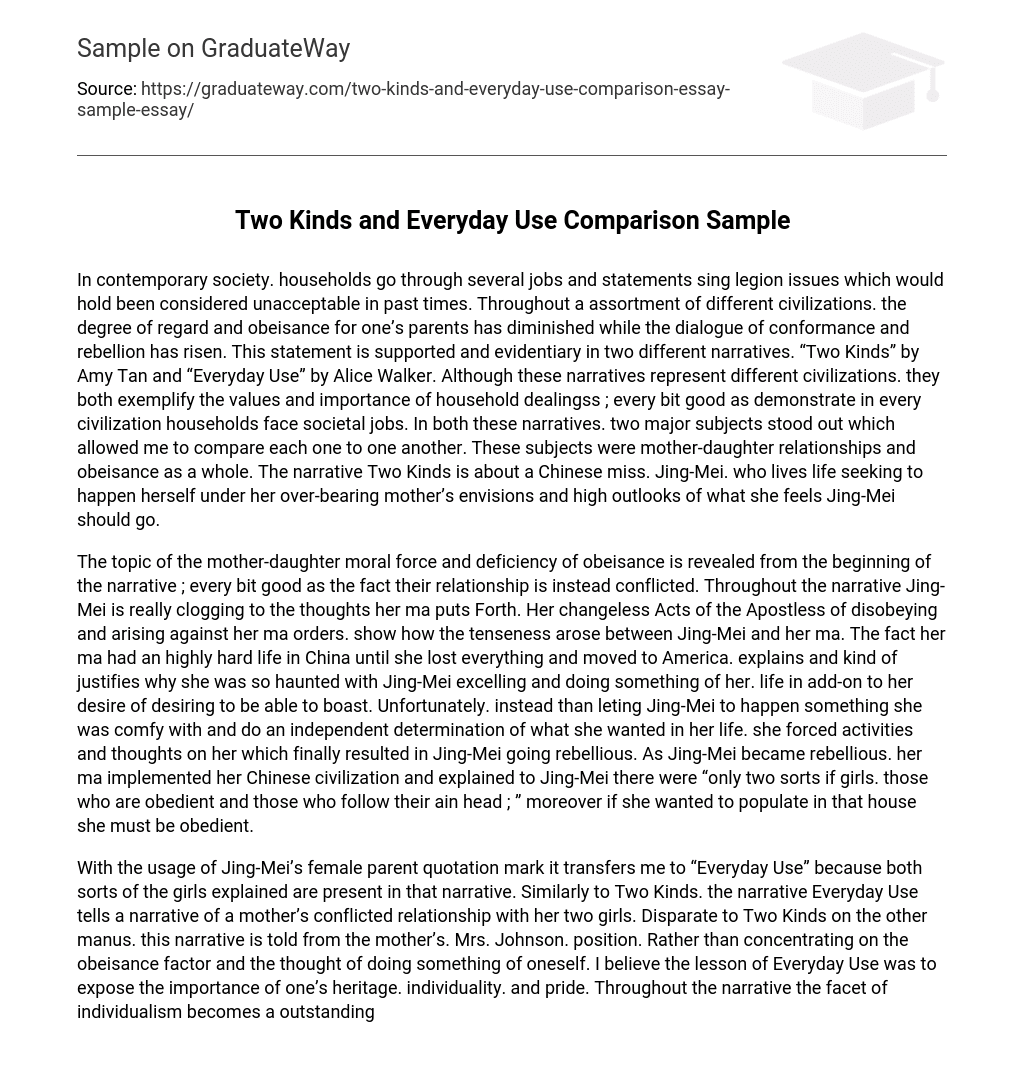In contemporary society. households go through several jobs and statements sing legion issues which would hold been considered unacceptable in past times. Throughout a assortment of different civilizations. the degree of regard and obeisance for one’s parents has diminished while the dialogue of conformance and rebellion has risen. This statement is supported and evidentiary in two different narratives. “Two Kinds” by Amy Tan and “Everyday Use” by Alice Walker. Although these narratives represent different civilizations. they both exemplify the values and importance of household dealingss ; every bit good as demonstrate in every civilization households face societal jobs. In both these narratives. two major subjects stood out which allowed me to compare each one to one another. These subjects were mother-daughter relationships and obeisance as a whole. The narrative Two Kinds is about a Chinese miss. Jing-Mei. who lives life seeking to happen herself under her over-bearing mother’s envisions and high outlooks of what she feels Jing-Mei should go.
The topic of the mother-daughter moral force and deficiency of obeisance is revealed from the beginning of the narrative ; every bit good as the fact their relationship is instead conflicted. Throughout the narrative Jing-Mei is really clogging to the thoughts her ma puts Forth. Her changeless Acts of the Apostless of disobeying and arising against her ma orders. show how the tenseness arose between Jing-Mei and her ma. The fact her ma had an highly hard life in China until she lost everything and moved to America. explains and kind of justifies why she was so haunted with Jing-Mei excelling and doing something of her. life in add-on to her desire of desiring to be able to boast. Unfortunately. instead than leting Jing-Mei to happen something she was comfy with and do an independent determination of what she wanted in her life. she forced activities and thoughts on her which finally resulted in Jing-Mei going rebellious. As Jing-Mei became rebellious. her ma implemented her Chinese civilization and explained to Jing-Mei there were “only two sorts if girls. those who are obedient and those who follow their ain head ; ” moreover if she wanted to populate in that house she must be obedient.
With the usage of Jing-Mei’s female parent quotation mark it transfers me to “Everyday Use” because both sorts of the girls explained are present in that narrative. Similarly to Two Kinds. the narrative Everyday Use tells a narrative of a mother’s conflicted relationship with her two girls. Disparate to Two Kinds on the other manus. this narrative is told from the mother’s. Mrs. Johnson. position. Rather than concentrating on the obeisance factor and the thought of doing something of oneself. I believe the lesson of Everyday Use was to expose the importance of one’s heritage. individuality. and pride. Throughout the narrative the facet of individualism becomes a outstanding characteristic. Mrs. Johnson ( Mama ) explains how even though Maggie and Dee. her two girls. grew up in the same house. they each developed two typical and contrasting positions of what their yesteryear. nowadays and hereafter is approximately. These positions finally became the footing in which Mama used when she had to conform to one her daughter’s beliefs.
Throughout the narrative. Mama explained how Maggie had a really low self-pride. remained uneducated. was really diffident. and covetous of her sister Dee. However. she accepted her heritage with pride and did non seek to alter who she was. unlike her sister who wanted to be called “Wangero. ” Dee. on the contrary. was educated. good-looking. demanding. and ashamed of her heritage. She liked to be known for her properties and tried to acquire rid of her past by altering her name ( which held great value ) and merely exposing things with worth from her yesteryear. In the narrative. a difference comes about. which was who should have the grandma’s comforters even though they were already promised to Maggie. Dee argued her sister wouldn’t appreciate the comforters ; she would set them to everyday use instead than hang them. Mama explained that was the intent of the comforters to be used ; it held no sentimental value because it was a mercenary thing. At this portion of the narrative. Mama conformed to Maggie’s demands by giving her the quilts alternatively of obeying Dee’s ( Wangero’s ) demands as usual. In the narrative Everyday Use. Dee otherwise known as Wangero. is the rebellious character merely as Jing-Mei was in Two Kinds.
These narratives show relation because the two sorts of girls Jing-Mei’s female parent describes in Two Kinds are apparent in Everyday Use. Maggie would be the obedient girl explained while Dee would be the 1 who chose to follow her ain head. Though both narratives represent different civilizations. the both embody the importance of imposts and tradition. As displayed in these narratives. there is non ever a common understanding within the household about several state of affairss. Even I have faced struggle within my household. while I was turning up a clip or two. Whether the issue involved something that you felt wasn’t carnival or it was merely because you were told to make something in which you did non desire to stay ; the fact remains in every civilization. household. life. or relationship. there will come a clip where a struggle will originate. It can be due to rebellion or merely a simple dissension but either manner it will be present. Both narratives “Two Kinds” by Amy Tan and “Everyday Use” by Alice Walker exemplify and validate that this is true. -Brianna Tillery





